“Pod baobabem spotkasz znów,
Miłych przyjaciół z tamtych dni”
“We meet again under the baobab tree,
Our dear old friends from long ago”
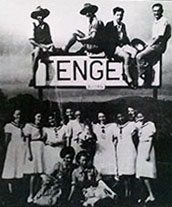
In Tengeru, Tanzania, many years ago.
So reads the motto of the Klub Pod Baobabem (Under the Baobab Tree Club), the international group of Polish friends who spent their childhood years growing up under the baobab trees of Africa.
They are all ethnically Polish, but they call themselves the “Afrykańczycy,” the “Africans.” Although they are scattered around the world, a core part of their identity and individual experiences involves exile to Soviet labour camps during WWII , followed by refuge under the warm sun of Africa. How can it be that individuals who experienced such objectively traumatic experiences, involving hunger and illness, separation from loved ones, and uncertainty of both fate and fortune, still gather in 2014 for their 25th reunion to celebrate their time in the refugee settlements of Africa?
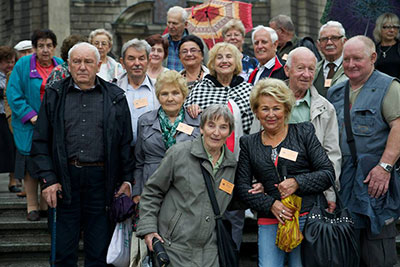
In Wroclaw, Poland, the reunited group during the sightseeing tour.
Their four day reunion in Wrocław, Poland from September 11-14 would make any student or academic conference feel busy. Nearly 100 attendees were full of energy and stamina as they made their way from sightseeing tours to gala “banquet” dinners. Once reunited, I felt that they became children again. Their eyes, their tone, their mannerisms… fascinating. I recall two elderly ladies from England, arm-in-arm, insisting “oh darling, you MUST go visit the cemetery down the road; it is simply nothing short of absolutely ENCHANTING, like a fairy tale!” And with shared laughter they continued on their stroll to buy flowers from the local street vendor. In this situation, I saw two children, delighting in the simplicities and beauty of day-to-day life.
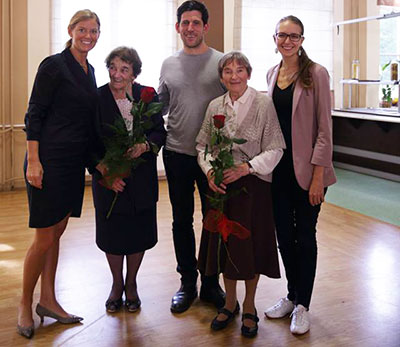
Subsequent generations of Afrykanńzycy: Rachael Jarosh (consultant + writer), Jonathan Durand (filmmaker), and Amanda Chalupa (researcher) with the reunion organizers.
It is important to note my personal involvement and relevance in this story. My grandparents on my father’s side experienced a similar fate as children as these people did. In their early teens, my grandmother and grandfather had been exiled from Eastern Poland to Soviet labour camps. In the early 1940s they found themselves in Africa, in Tengeru and Lusaka respectively. My life has involved a deep rooted fascination regarding how they and their friends have talked about their experiences. The positive way by which they talk about their time in Africa seems to differ from the current rhetoric around refugees and migrants. It has been my academic and professional pursuit to uncover what it was about their experience that helped them adapt to different migratory situations, the potential beneficial model that can be drawn from the settlements that were established for these children, and how to apply this insight with children who are currently refugees.
When I called the organizers to say that I was going to be in Poland during the dates of their reunion, without hesitation or my even asking, I was invited to join their reunion. “You will join us of course, right?” After all, I learned that I am considered part of their family.
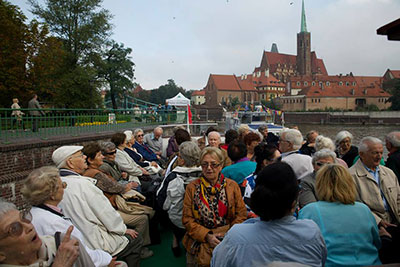
A boat tour along the Odra River.
Unfortunately I was only able to attend the last two days of the four day reunion. Ironically – or appropriately actually – I arrived in Wrocław right as they were about to leave on a one-hour boat tour along the river. I missed the boat. By 10 seconds. It allowed me the opportunity to take a picture of them waving to me from the boat. It also allowed me to reflect on what it could have felt like to have been one of those children missing the boat to Mombasa, or Italy, or Canada, or New Zealand. Of course me missing that boat tour in no way compares to the repercussions that they would have experienced, but I nevertheless took that opportunity to empathically engage in what that experience would have been like…
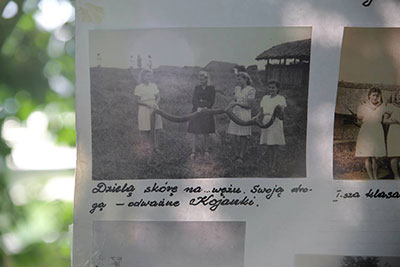
This friendly snake couldn’t make it to the reunion.
“Is this the singing bus?” asked one enthusiastic attendee, as we were boarding the buses to head to our next destination, “because I want to make sure that I am on the singing bus!” By the singing bus, she meant the bus where old Harcerstwo friends would sing songs from their Scouting days. I soon learned that they also had their own song book. This collection of theme songs from each reunion spoke of wild animals, jungle adventures, always being connected and young at heart. The songs were sung by all in the dining hall during the banquet dinner. As the evening came to a close, attendees from each of the different African settlement camps gathered themselves for one more photo and group hug. A sample from the 1994 song captures the spirit of the reunion’s closing dinner:
Afrykańska zgrana klika,
Zawsze młoda, roześmiana –
Myśli ktoś, że mamy bzika,
Bo śpiewamy już od rana!
The African gang stands united,
Always young and always smiling,
One might think that we have lost it,
For we’ve been singing since the morning!
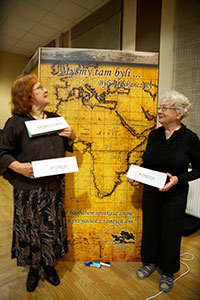
Two friends stand in front of a map of Africa, on which attendees wrote their names where their settlements were located; the title reads “We were there…”
Jonathan Durand, a filmmaker whose grandmother spent time in Tengeru, Tanzania, was at the reunion filming for his documentary “Memory is Our Homeland”. “What’s incredible is how young they all become, when they’re singing and dancing and reminiscing together. Watching a group of elderly people play a game of musical chairs is already remarkable. But knowing that they did this together as young people in refugee settlements in Africa, then seeing their faces melt back into who they were 70 years ago, that’s stunning,” Durand said.
Of course, it is necessary to mention the potential for self-selection. Individuals who choose to rejoice around this shared experience must see something positive in it; those who do not simply do not show up. Nevertheless, similar reunions have been taking place around the world. In England, for example, there tend to be reunions of the children who had been in India. Reunions in Connecticut cater to the Afrykańczycy of the North East, in Chicago for those who were in Santa Rosa, Mexico, and in Poland for those who were in Lebanon. Most recently, a reunion of the children who found refuge in Pahiatua took place alongside the “Celebrating Everything Polish” festival in New Zealand.
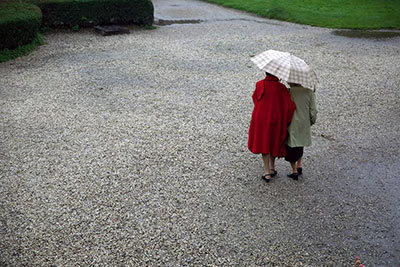
Childhood friends walk arm-in-arm under the rain in Poland during the reunion.
There does not seem to be much known about these reunions, especially not in broader society. There may be many reasons for this, such as a lack of knowledge about the historical events and migration experienced by this group of individuals. But here I am curious about one particular aspect of this story. Is speaking positively about time in refugee settlements regarded as insensitive or as “undermining trauma and suffering?” I would argue the opposite. Denying individuals the opportunity to celebrate positively-remembered events and circumstances, their successes, and assuming that all have been destroyed emotionally and psychologically by their experiences, undermines the courage, strength, and genuinely good times experienced by many of these children. I believe that it is important, if not necessary, to allow individuals the space to reflect on their lives, especially if they are finding something positive to remember and re-experience. There is something worth studying here, and the research is long overdue.
Let’s let the kids be kids, even if their bodies are 85 years old.
CR


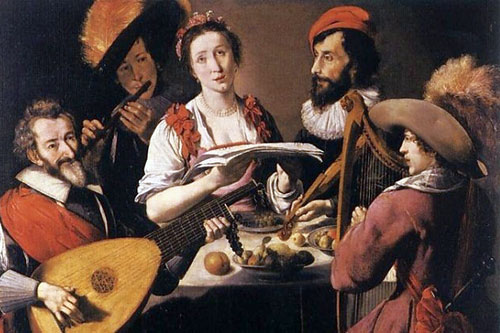
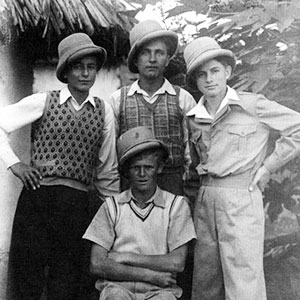
Pingback: Welcome to our 2014 Fall-Winter Issue!
I have pictures of both my Grandmother and Aunts funeral here. I was impressed by the amount of people that were present. http://aylmermaycemetery.com/index.html
Thank you, Carol, for the read and for sharing this link 🙂 I was not familiar with this particular cemetery.
Pingback: Chatting with Greg Archer
I am a 53 years old Dutch journalist/writer/communication advisor who just did research for my Masterthesis Afrikastudies about the exodus of Poles from Persia to east africa. I did research in Zambia in the national archives and went to former Abercorn camp to visit a Polish grave, see some remains and talk to old Zambians who were boys when the Poles were there. I have a lot of information about life in the camp, rules, problems and even listst of names of Poles who stayed in Abercorn and a map of the camp. Polish officals and professors in America and the Netherlands told me I am the first one who did such a research. Therefor I would like to use my information for more then just a thesis, because the history of the Poles in East Africa must be integrated in the history of WW2. Articles? A book? An exhibition? (A museum in Zambia in Mbala (which was Abercorn) wants an exhibition and the Polish consul in Lusaka, Zambia, is enthusiatic) I would love to get ideas for a podium for this story.
Pingback: Bulletin Board Fall 2015
Pingback: Welcome to Winter 2016!
Pingback: The Africa Connection
Great article. My mom mentioned Lusaka often.